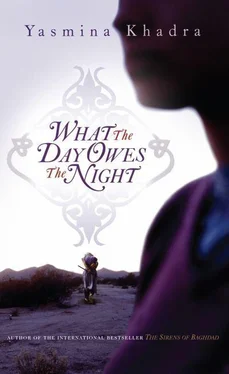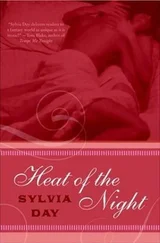Some nights, seized by a nameless fear, I imagined him drunk and unkempt, wandering through some squalid neighbourhood pursued by a pack of street urchins. When the fear took hold of me, it was as though my wrists were trapped in a vice, a vice exactly like the one that had almost forced my coins into my flesh the night I tried to make my father proud of me by giving him the money I had made selling goldfinches.
My father’s desertion stuck in my throat; I could neither swallow it nor spit it out. I felt I was to blame. My father would never have abandoned my mother and my sister if he hadn’t run into me that night. He would have gone home, slept it off and none of the neighbours would have suspected a thing. My father was a man of principles. He used to tell me that if a man should lose his money, his land, his friends, his fortune, even his bearings, there was always a possibility, however small, for him to get back on his feet again, but that if a man lost face, then all the rest was futile.
My father had lost face. Because I had seen him that night, seen him at his lowest ebb. This was what he could not bear. He had been determined to prove to me that he would not allow misfortune to break him. But the look I had seen on his face as he struggled to stand outside the bar in Choupot told me something different. There is a despair from which there is no way back; that was what I had seen in my father’s face.
I blamed myself for taking that particular street, for passing at precisely the moment when the barman tossed my father into the gutter and my world with him; I blamed myself for leaving Lucette so quickly, for spending too much time staring in shop windows . . .
At night, in the darkness, I brooded on my sadness, searching for something that might absolve me. I was so miserable that one night I went into the box room to look for the statue of the winged boy that had terrified me on my first night in my uncle’s house. I found it at the bottom of a musty crate full of bric-a-brac, dusted it off and set it on the mantelpiece opposite my bed. I stared at it intently, convinced that I would see its wings flap, its head turn towards me . . . Nothing. The winged boy stood on its pedestal, mute, unknowable, and just before dawn I put it back in its crate.
* * *
‘God is cruel!’
‘It has nothing to do with God, son,’ my uncle said. ‘Your father decided to leave, that’s all there is to it. The Devil didn’t push him nor the Angel Gabriel lead him by the hand. Your father did everything he could, but after a while, he couldn’t take it any more. It’s as simple as that. Life is ups and downs – there is no middle ground. The important thing to remember is that you don’t have to go through it alone. Misfortune is like lightning, it doesn’t decide when or where to strike; it doesn’t realise, doesn’t suspect what tragedy it brings. If you want to cry, then cry; if you want to hope, then hope, pray, but there is no sense looking for something or someone to blame.’
And so I cried and I prayed, and as the months passed, the ceiling above my bed slowly went back to being just a ceiling. Taking Lucette by the hand, I went back to school. There were hundreds of other children like me, children who had done nothing wrong and who, like me, had suffered some tragedy and were patiently serving out their time, coping as best they could. If they did not ask questions it was because they knew they would not like the answers.
Mysterious guests continued to show up at my uncle’s house in the dead of night. They would arrive one by one and sit for hours with my uncle in the living room, smoking like chimneys – the whole house reeked of cigarette smoke. Their meetings always followed the same course: at first their discussion was calm and full of thoughtful silences, then it would become loud and impassioned, threatening to wake the neighbours. My uncle would take advantage of his position as master of the house to pour oil on troubled waters. If they could not agree, they would go out to the garden for some air and I would watch the tips of their cigarettes glowing in the darkness. When the meeting was over, they would tiptoe out, one by one, carefully checking to make sure no one was watching, then disappear into the night.
The morning after these meetings, I would invariably find my uncle in his study, jotting notes in a large hardback notebook.
One night, my uncle asked me to come and join his guests in the living room. He proudly introduced me to them. I recognised some of the faces. The meeting that night was different, less strained, almost solemn. Only one man spoke, the others hanging on his words. He was a man of great charisma, and clearly an honoured guest; my uncle was obviously in awe of him. Only much later did I put a name to his face: it was Messali Hadj, the guiding light of the movement for Algerian independence.
In Europe, war exploded like a blister.
Poland fell to the Nazi jackboots with terrifying ease. Where everyone had predicted fierce resistance there were only a few pitiful skirmishes, quickly crushed by the advancing Panzer divisions. The stunning success of the Nazi forces provoked terror and fascination. People began to turn their attention northward and watch as events on the far side of the Mediterranean played out. The news was not good; the spectre of an all-consuming conflagration haunted them. On café terraces men sat poring over their fears in the newspapers. People stopped each other in the street, they argued, they gathered in bars or in parks and talked in hushed whispers about how Europe was on the road to ruin. At school, our teachers no longer paid us any attention. They would arrive every morning with more news, more questions, and leave every evening with the same fears, the same anxieties. The headmaster had gone so far as to install a wireless in his office, where he spent most of the day listening to the news, indifferent to the thugs and bullies who now ran amok in the playground.
Germaine no longer took me out on Sundays after mass, instead she disappeared, shutting herself away in her room, kneeling in front of the cross, intoning interminable litanies. She had no family in Europe, but still she prayed that reason would triumph over madness.
Since my uncle also began to disappear more and more often, going out with a briefcase full of tracts and pamphlets under his coat, I relied more and more on Lucette for company. We would lose ourselves in our games until we heard a voice telling us it was time for dinner or time to go to bed.
Lucette’s father, Jérôme, was an engineer in a factory close to where we lived. At home, he spent much of his time with his nose in an engineering book or lying on the sofa listening to Schubert on the gramophone, and so no longer bothered to check to see what we were up to. Jérôme was tall and thin, his face half hidden behind thick round glasses, and he seemed to live in his own little world, careful to keep his distance from everyone and everything, including this war that seemed about to consume the whole planet. Summer and winter he wore the same khaki shirt with its breast pocket stuffed full of pens. He only ever spoke if we asked him a question, and even then he answered as though we were interrupting him. His wife had left him some years after Lucette was born and he had never quite got over it. Though he could not refuse Lucette anything, I never saw him hug her. At the cinema, where he always took us to see silent serials, I would have sworn that as soon as the lights went out, he disappeared. At times he frightened me, especially when he casually told my uncle he was an atheist. I had not realised before that moment that atheists existed. I was surrounded by believers: my uncle was Muslim, Germaine was Catholic, all our other neighbours were Jewish or Christian. At school and in the street, everyone talked about God, believed in God – I was shocked to discover Jérôme getting by without Him. Once, I overheard him tell an evangelist who called to his house: ‘Every man is his own god. In choosing to follow another god he denies himself and in doing so becomes blind and unjust.’ The evangelist looked at Jérôme as though he were the Devil incarnate.
Читать дальше












